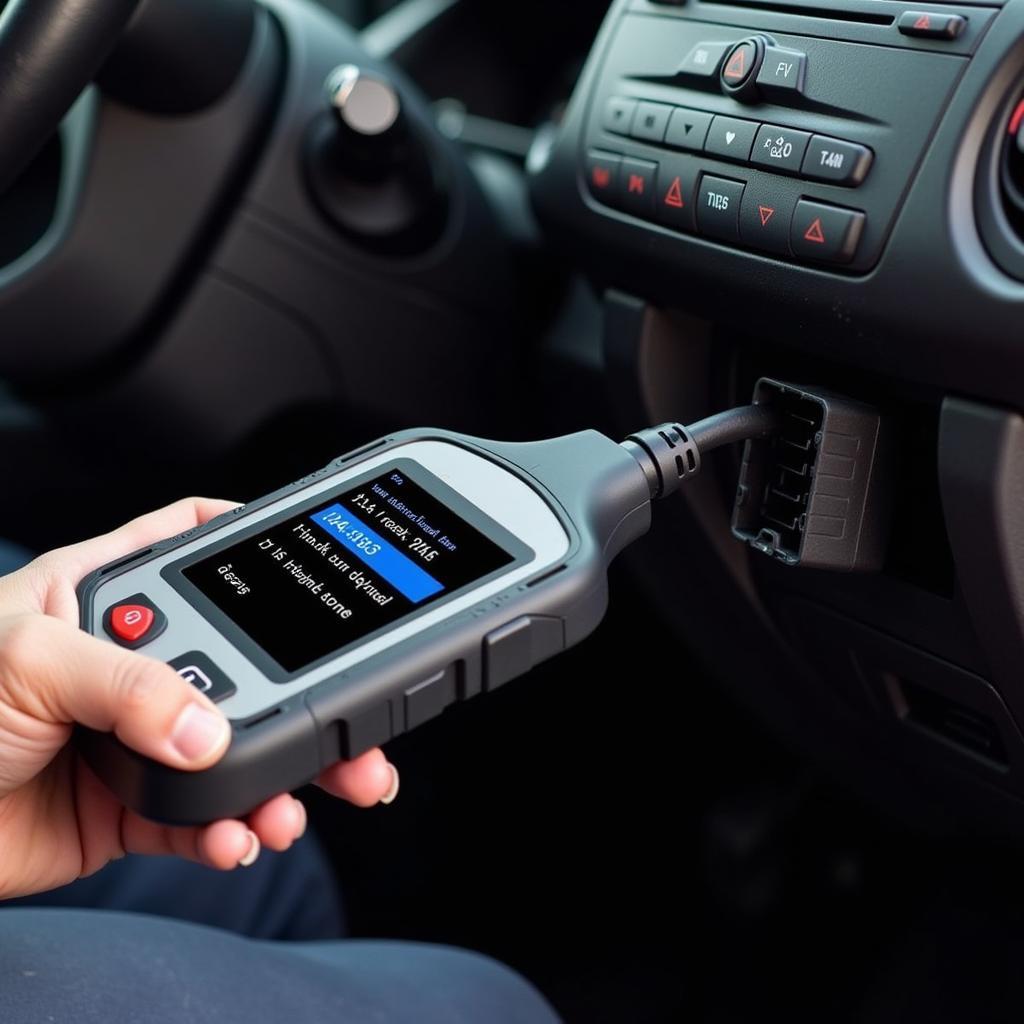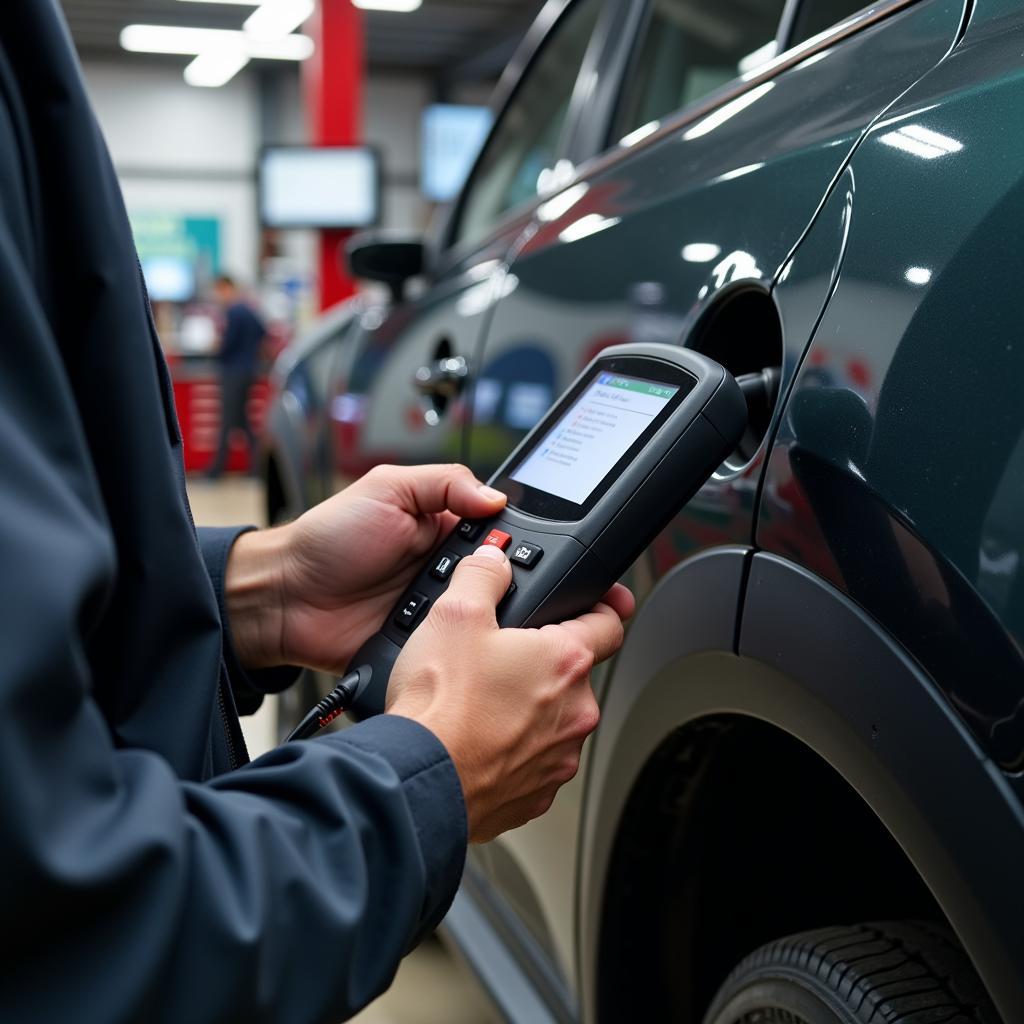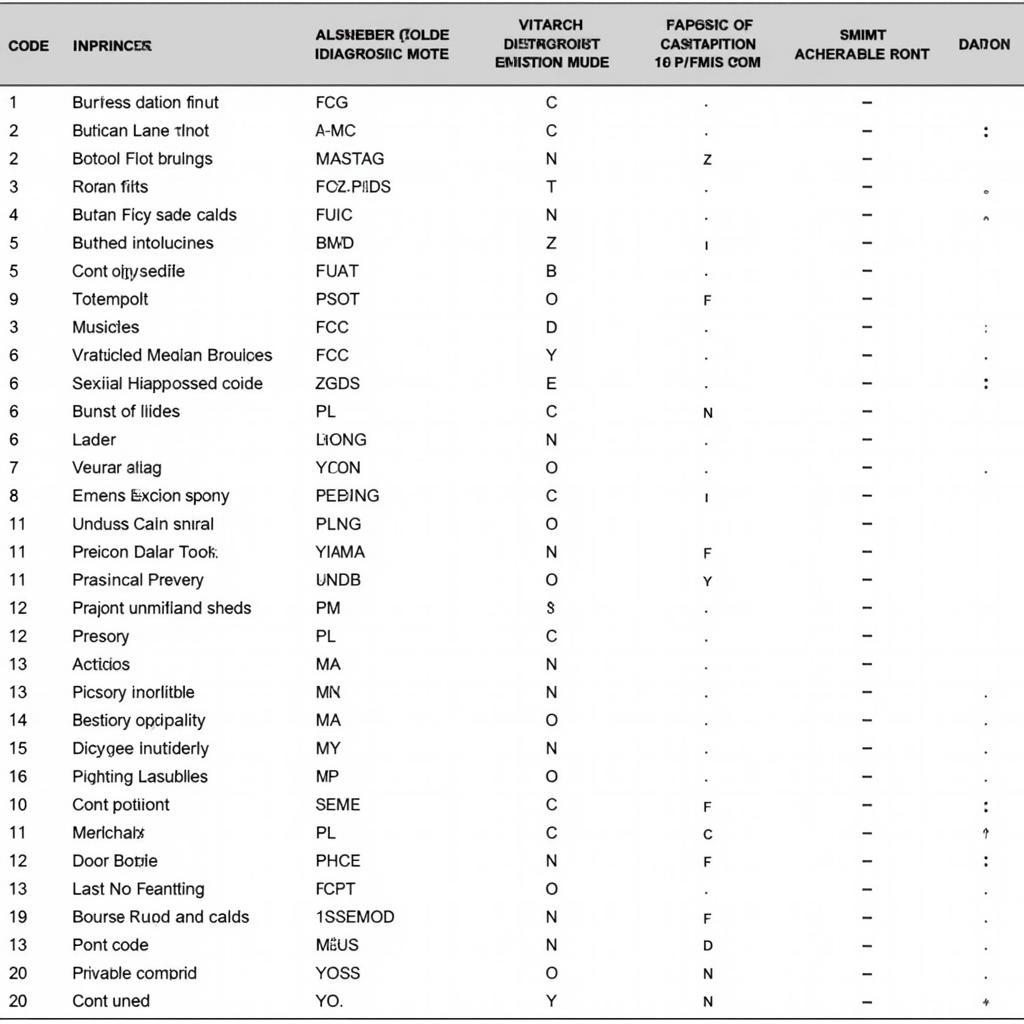Car diagnostic codes, also known as Diagnostic Trouble Codes (DTCs), are like secret messages your car uses to tell you what’s going on under the hood. They’re alphanumeric codes that are stored in your car’s onboard computer, the Engine Control Unit (ECU). Think of the ECU as your car’s brain; it monitors various systems and sensors, and when it detects a problem, it logs a corresponding DTC.
Deciphering the Code: Understanding DTCs
 Car Diagnostic Codes on OBD2 Scanner
Car Diagnostic Codes on OBD2 Scanner
Imagine your car’s dashboard warning lights as a distress signal. They alert you to an issue, but they don’t always tell you exactly what’s wrong. This is where car diagnostic codes come in.
Each DTC consists of five characters:
- The first character: Indicates the system where the fault is located. For example, “P” stands for Powertrain, “B” for Body, “C” for Chassis, and “U” for Network & Communication.
- The second character: Specifies whether the code is generic (common to all vehicles) or manufacturer-specific. “0” represents a generic code, while “1” indicates a manufacturer-specific code.
- The last three characters: Pinpoint the specific area or component within the system that’s experiencing the problem.
For instance, the code “P0301” tells you there’s a misfire detected in cylinder 1 of the engine. This level of detail helps you or your mechanic quickly identify the root of the problem.
Why Are Car Diagnostic Codes Important?
 Mechanic Using Diagnostic Scanner to Identify Car Issues
Mechanic Using Diagnostic Scanner to Identify Car Issues
Car diagnostic codes are crucial for a number of reasons:
- Early Detection: DTCs often appear before noticeable symptoms arise, allowing you to address minor issues before they escalate into major repairs.
- Accurate Diagnosis: Instead of relying on guesswork, DTCs provide specific information about the problem, leading to quicker and more accurate repairs.
- Cost Savings: By pinpointing the faulty component, car diagnostic codes can save you money on unnecessary repairs and labor costs.
- DIY Repairs: For the mechanically inclined, DTCs can empower you to diagnose and potentially fix some issues yourself.
How to Read Car Diagnostic Codes
You can retrieve car diagnostic codes using an OBD2 scanner. These handy devices are widely available and relatively inexpensive. Simply plug the scanner into your car’s OBD2 port (usually located under the dashboard on the driver’s side) and follow the on-screen instructions to read the codes.
However, interpreting these codes accurately requires some technical knowledge. While online resources can provide basic information, consulting a qualified mechanic who has access to manufacturer-specific databases and repair manuals is often the best course of action, especially for complex issues.
Common Car Diagnostic Code Myths Debunked
There are some common misconceptions surrounding car diagnostic codes:
- “A code means the part needs replacing.” Not necessarily! A code indicates a fault in a system, but the actual problem could be a loose connection, a faulty sensor, or even a temporary glitch.
- “Clearing codes solves the problem.” While clearing codes might temporarily turn off the warning light, it doesn’t address the underlying issue, which will likely resurface.
- “All codes are serious.” Some codes indicate minor issues, while others signal potentially dangerous problems. Understanding the severity of the code is crucial.
 List of Car Diagnostic Codes
List of Car Diagnostic Codes
DiagFixPro: Your Trusted Source for Car Diagnostic Information
DiagFixPro is committed to providing you with comprehensive and reliable information on car diagnostic codes. Our website offers a wealth of resources, including:
- A searchable database of car diagnostic codes with detailed descriptions.
- Informative articles and guides on understanding and using car diagnostic codes.
- Tips and advice on troubleshooting common car problems.
Whether you’re a car enthusiast looking to learn more about your vehicle or a DIY mechanic tackling a repair, DiagFixPro is here to guide you.
Have questions about a specific car diagnostic code? Need help interpreting the results from your OBD2 scanner? Visit our website or contact our team of automotive experts – we’re here to help you keep your car running smoothly.
FAQs
1. What does a “Check Engine” light mean?
The “Check Engine” light can indicate a wide range of issues, from minor problems like a loose gas cap to more serious concerns like engine misfires or emissions system failures. Using an OBD2 scanner to retrieve the associated diagnostic code is the best way to determine the specific problem.
2. Can I drive my car with a diagnostic code?
It depends on the code and the severity of the issue. Some codes might allow you to continue driving for a short period, while others require immediate attention. It’s always best to err on the side of caution and consult a mechanic if you’re unsure.
3. Are generic OBD2 scanners reliable?
Generic OBD2 scanners are generally reliable for reading and clearing basic diagnostic codes. However, they might not provide access to all manufacturer-specific codes or advanced diagnostic functions.
4. Do I need a special OBD2 scanner for my car model?
While generic OBD2 scanners work with most vehicles manufactured after 1996, some car manufacturers use proprietary software or connectors that might require a model-specific scanner.
5. How often should I get a car diagnostic check?
It’s a good idea to get a car diagnostic check during regular maintenance, such as an oil change or tune-up. Additionally, consider a check if you notice any unusual performance issues or warning lights on your dashboard.
6. Can weather conditions affect car diagnostic codes?
Yes, extreme temperatures, humidity, or water exposure can sometimes trigger temporary diagnostic codes or affect sensor readings.
7. Where can I learn more about car diagnostic codes?
DiagFixPro offers a wealth of information on car diagnostic codes, including articles, guides, and a searchable database. You can also find valuable resources on automotive forums and websites dedicated to specific car makes and models.
Need further assistance?
Contact our team of car diagnostic experts via WhatsApp: +1(641)206-8880 or Email: [email protected]. We provide 24/7 support to help you with all your car diagnostic needs.

Leave a Reply